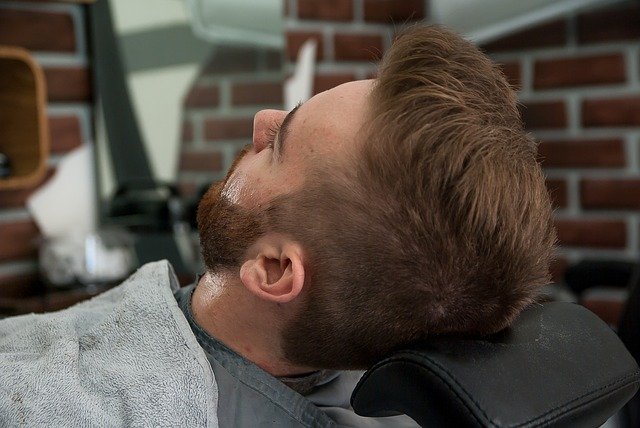Time to Embrace Your Natural?
COVID-19, Quarantine, Safer At Home, Stay At Home, Social Distancing in addition to being new words in our daily vocabulary, have also had the unintended consequence of altering the narrative regarding our typical grooming habits. Facebook and YouTube are filled with images of Corona-cut how-to’s as well as some epic failures. Celebrities are all over social media embracing or fighting heroically against their natural look. Gabrielle Union and her Corona Curls, Kelly Ripa minus Botox, Sharon Osborne’s turban, Kyle Richards sans makeup, Cedric the Entertainer, Kevin Hart and Jane Fonda all sporting a new silver look. Eva Longoria has gone so far as to film a home commercial for L’Oréal coloring her own grays. While some of these are hilarious and a bit superficial, it is allowing us to laugh at ourselves and take a long look at what is essential and what is superfluous. Pedicures, Manicures, Hair coloring, shaving and massages have gone by the wayside and it will be interesting to see how much people are willing to return to their pre-pandemic grooming routine.
In Healthcare the archaic notion of a perfectly groomed and coiffed nurse, the old masks vs. make-up discussion has been forever altered. The world is acknowledging that safety, compassion and quality care are the benchmarks over lipstick, mascara, beard trims and piercings. It seems logical now to reevaluate these surface enhancements considering the far deeper topic of personal safety vs. self-expression. Traditional euro-centric beauty standards have dominated culture for years. The discussion between what is beauty, self-expression, necessity, enjoyment and expectation has also been counter balanced by time, effort, cost, and inconvenience. The expense alone can be daunting, especially for women where coloring, cuts, manicures, pedicures and the accompanying products can easily reach to 100’s of dollars per month. In sharp contrast for example, my husband’s monthly grooming expenses at best run significantly less than $100/month. This is really not a frivolous discussion because 47% of the workforce in the United States is comprised of women. When looks are valued more or held to a higher standard than work ethic or production this becomes a legitimate discussion. It is called beauty-bias or lookism; the more attractive a person is perceived, the more likely he or she is recognized, favored and promoted. This goes way back to our school days with stereotypical popularity going to the attractive cheerleaders and rarely to the science scholars.
No one will deny that youthful appearance can significantly impact perceptions and first impressions. The image of a well turned out, well groomed and immaculate medical professional has been proven to influence patient confidence, satisfaction and even outcomes. The advent of COVID-19 has changed the narrative of how patient confidence can be increased with minimal visual cues from healthcare providers who are gowned and masked. In a recent survey of nurse management, only one mentioned appearance as an important consideration for leadership and that was in reference to dressing for the position you want, not the one you are interviewing for. In another poll (pre-pandemic) medical professionals were about evenly divided between those who did and did not wear makeup while working. They cited things like cost, time, sweating, raccoon eyes, itching, tears and the general belief that it just does not matter to their patients.

The global COVID-19 pandemic has diminished to the point of ridiculousness the focus on looks over works. Perhaps the following could be adopted as guidelines for professional self-care and grooming going forward:
- Smile and Be Kind: The best way to show your natural beauty. Those who smile are automatically perceived to be kind and kindness equals beauty to peers.
- Act Confidently: People rarely, or at least hesitantly question a confident person. Confidence is a socially desirable trait and a foundation for success. Stepping out of your comfort zone can help you succeed. Confidence is equated with attractiveness. Remaining sincerely humble prevents confidence from becoming cockiness.
- Mental Health: Taking care of your mind, emotions and spirit. Being OK with not being OK all the time but asking for help when needed. Being alone with yourself increases your self-reliance which will increase your empathy, productivity and creativity. Consider frequent Digital-Detox times to unplug and reconnect with the actual world around you.
- Physical Fitness: Exercise improves overall health and keeps you mentally able as well. As you release endorphins you increase your happiness. Physically fit staff are more productive, efficient and confident.
- Indulge Yourself: Yes, take a day off, take a bubble bath, get a pedicure, have a hot towel and scalp massage at the barber.
- Sleep: That often elusive cure-all. A good night’s sleep increases mental stamina, physical appearance, beautiful skin, stress reduction and memory. Try Melatonin, Lavender, Valerian Root and herbal tea with honey.
Nurses and other medical professionals have the knowledge and solutions for improving care and keeping people safe and they bring compassion needed to provide for the physical, spiritual and emotional support for those in their care. It only works if you take care of your whole self by eating properly, getting enough rest, exercising and taking personal time. Healthcare staff need to be strong physically, emotionally and spiritually in order to provide the best care and model appropriate behavior for peers and patients alike. Now, more than ever, we can shift the balance about what is essential and what is not. This pandemic has frightened us, challenged us and changed us. Embracing Your Natural or not, we really do have the opportunity to discover the best version of ourselves.
The team at NHS Solutions is able and ready to fulfill urgent leadership gaps for our hospital clients. We have strong clinical and non-clinical interim leaders available to face new challenges. Contact us to discuss your hospital’s Interim Leadership needs or speak to a recruiter to discuss your next career move into Interim Healthcare Leadership.
